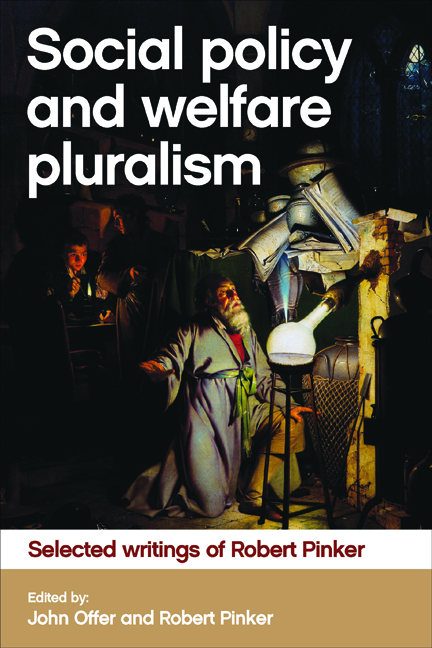Book contents
- Frontmatter
- Contents
- Acknowledgement
- Preface
- General introduction: Robert Pinker on rethinking approaches to welfare
- Introduction to Part One On social policy studies
- one The ends and means of social policy: a personal and generational perspective
- two Social theory and social policy: a challenging relationship
- three Stigma and social welfare
- four The welfare state: a comparative perspective
- five Richard Titmuss and the making of British social policy studies after the Second World War: a reappraisal
- Introduction to Part Two On social care, communities and the conditions for well-being
- six Report of the Working Party on the Role and Tasks of Social Workers: an alternative view
- seven The quest for community: from the Settlement Movement to the Griffiths Report: an historical perspective
- eight Citizenship, civil war and welfare: the making of modern Ireland
- Introduction to Part Three On welfare pluralism
- nine Golden Ages and welfare alchemists
- ten From gift relationships to quasi-markets: an odyssey along the policy paths of altruism and egoism
- eleven The experience of citizenship: a generational perspective
- twelve The right to welfare
- thirteen The prospects for social policy in the UK after the 2015 General Election
- Afterword On the post-Brexit prospects for social policy in the UK
- References
- Index
four - The welfare state: a comparative perspective
Published online by Cambridge University Press: 08 April 2022
- Frontmatter
- Contents
- Acknowledgement
- Preface
- General introduction: Robert Pinker on rethinking approaches to welfare
- Introduction to Part One On social policy studies
- one The ends and means of social policy: a personal and generational perspective
- two Social theory and social policy: a challenging relationship
- three Stigma and social welfare
- four The welfare state: a comparative perspective
- five Richard Titmuss and the making of British social policy studies after the Second World War: a reappraisal
- Introduction to Part Two On social care, communities and the conditions for well-being
- six Report of the Working Party on the Role and Tasks of Social Workers: an alternative view
- seven The quest for community: from the Settlement Movement to the Griffiths Report: an historical perspective
- eight Citizenship, civil war and welfare: the making of modern Ireland
- Introduction to Part Three On welfare pluralism
- nine Golden Ages and welfare alchemists
- ten From gift relationships to quasi-markets: an odyssey along the policy paths of altruism and egoism
- eleven The experience of citizenship: a generational perspective
- twelve The right to welfare
- thirteen The prospects for social policy in the UK after the 2015 General Election
- Afterword On the post-Brexit prospects for social policy in the UK
- References
- Index
Summary
I am greatly honoured by your invitation to give the James Seth Memorial lecture for 1972 in this university. James Seth, I know, is remembered with affection in Edinburgh not only for his outstanding contributions as a scholar and teacher, but for his lifelong involvement in the social welfare services of Edinburgh. James Seth was an example of that honourable tradition in academic life which holds that a university can and ought to contribute to the social well-being of its local community. His achievements in the practical tasks of social welfare are a testimony to his generosity of spirit. I hope that the subject of this lecture will have some relevance to those academic and social issues which concerned James Seth during his lifetime.
Over forty years ago, Elie Halevy delivered the third series of Rhodes Memorial lectures on the subject of ‘The World Crisis of 1914–1918’. His concern was ‘to define the collective forces, the collective feelings and the movements of public opinion, which, in the early years of the twentieth century, made for strife’. I shall attempt in this paper, with far less qualification for the task, to make a similar analysis of those collective forces which have been most instrumental in the making of social welfare. In doing so, I shall also be examining the extent to which the same collective sentiments and opinions which have been most influential in the creation of modern welfare states have also served to inhibit the growth of international systems of welfare. I begin with some comments on the traditionally collectivist bias and narrowly drawn boundaries of our subject. In the second part, I outline an analytical framework which may assist in the development of comparative welfare studies. The third section of the paper presents some evidence concerning the development of welfare policies within three major industrial nations – Britain, the United States and Russia. The fourth section is concerned with the international implications of these developments, with particular reference to trends in migration and migration control.
This paper does not presume to be more than an exploratory exercise. Its coverage is limited to three major industrial nations and even this degree of restriction is an affront to intellectual modesty.
- Type
- Chapter
- Information
- Social Policy and Welfare PluralismSelected Writings of Robert Pinker, pp. 69 - 92Publisher: Bristol University PressPrint publication year: 2017

